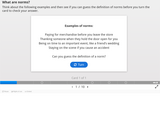
Note card on norms
- Subject:
- Career and Technical Education
- Criminal Justice
- Material Type:
- Interactive
- Provider:
- Michigan Virtual
- Date Added:
- 06/26/2019

Note card on norms
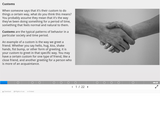
Video and audio slideshow on customs and laws
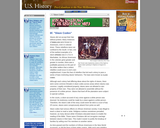
Slaves did not accept their fate without protest. Many instances of rebellion were known to Americans, even in colonial times. These rebellions were not confined to the South. In fact, one of the earliest examples of a slave uprising was in 1712 in Manhattan. As African Americans in the colonies grew greater and greater in number, there was a justifiable paranoia on the part of the white settlers that a violent rebellion could occur in one's own neighborhood. It was this fear of rebellion that led each colony to pass a series of laws restricting slaves' behaviors. The laws were known as slave codes.
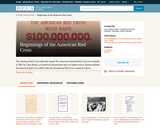
The American Red Cross (officially named The American National Red Cross) was founded in 1881 by Clara Barton, an American humanitarian and civil rights activist. Barton modeled the American Red Cross (ARC) after the International Red Cross, based in Geneva, Switzerland, which she encountered while volunteering in Europe during the late 1800s. She envisioned an organization that would provide humanitarian aid during wartime and in the event of national calamities.
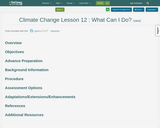
Students will review potential impacts of climate change on Michigan and determine both adaptive and individual mitigation strategies
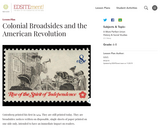
Drawing on the resources of the Library of Congress's Printed Ephemera Collection, this lesson helps students experience the news as the colonists heard it: by means of broadsides, notices written on disposable, single sheets of paper that addressed virtually every aspect of the American Revolution.
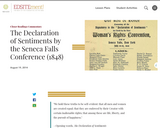
This feature outlines the context of The Seneca Falls Convention of 1848 which produced the "Declaration of Sentiments," a MI exemplar for grades 11 CCR. This document made a bold argument, modeled on the language and logic of the Declaration of Independence that American women should be given civil and political rights equal to those of American men, including the right to vote.
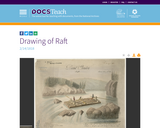
On February 14, 1818, David Gordon received a patent for his raft design. When a patent is granted, it excludes others from making, using, offering for sale, or selling the invention. This drawing accompanied Gordon’s application.
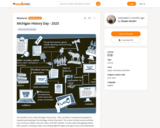
This Moodle course, titled 'Michigan History Day - 2025', provides a comprehensive guide for students participating in the Michigan History Day event. The course includes various activities such as forums, labels, resources, URLs, and H5P activities. It covers topics like getting started with research, choosing a topic, and creating different types of projects such as documentaries, exhibits, papers, performances, and websites. The course also provides checklists, evaluation forms, and examples to help students understand the requirements and expectations for each project category.